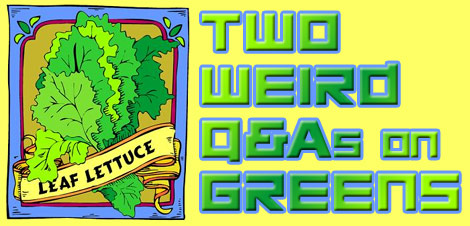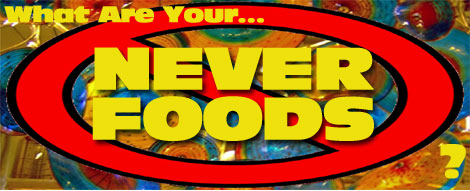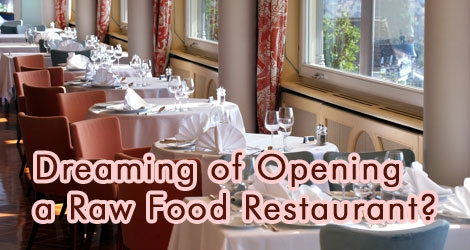
We all know what "greens" are in general. For example, no one questions whether lettuce, kale, spinach, or chard are greens. But on the other hand, all of those items *are* also clearly green in color. With that in mind, what would you make of the following two questions I (Jim) recently pondered -- tagged as "reader questions" so they're easily found in the future by other equally inquisitive people ;-) -- that seem bizarre, but are really quite interesting?
1. Are non-green greens (e.g., purple kale) still considered greens2. Are vegetables with green skins (e.g., cukes, zucchini) considered greens? (After all, they're green!)

Jim here... I was listening to a radio commercial the other day that promised to reveal the "secrets that credit card companies DON'T want you to know." You hear that kind of rather manipulative marketing all the time, right? It's a psychological thing, I suppose -- filling your mind with intrigue almost instantly. My credit is pretty decent, but I was thinking, "Wow, I wonder what those secrets are?!" We humans are curious creatures, aren't we?
But then I started to laugh to myself, imagining a raw foods radio spot adopting that technique. "Buy our special report and learn all of the Secrets that Raw Foodists do NOT Want YOU to Know!!!" And then I laughed some more. Know why? Because, when you think about it, there are absolutely, positively NO secrets raw foodists don't want you to know! Isn't that stunningly cool? In fact, the entire message of the movement is conveniently included right there in the words "raw foods." It couldn't be simpler -- the cure for what ails so much of the planet, neatly summed up in two words.

Jim here... Yesterday, we talked about exceptions -- those non-raw food items that raw foodists sometimes allow themselves to eat. I listed mine, and a number of people here and on Facebook noted some of their own. (Seems a lot of us enjoy olives, by the way!) It struck me today that a natural follow-up to a list of exceptions would be a list of non-exceptions -- basically a list of things I personally never ever ever ever consume.
This makes sense, right? I suppose all people generally have three basic lists: (1) those things we eat regularly, (2) those things we eat sometimes, and (3) those things we never eat. Hopefully, none of us keep these lists etched in stone, as diets are dynamic things that tend to evolve over time. A few of the items I'll list below may only apply to my current practices, while others (like refined sugar) I hope to permanently exclude. So, let's see:
Read more: Yesterday: Exceptions. Today: Things I *Never* Consume

Jim here... When you consider the agricultural and marketplace practices that affect the food we eat (e.g., pesticide use in the fields, widespread irradiation afterward, and the contamination of produce from various sources -- not to mention some of the disturbing potentialities we face in terms of further governmental intervention into the food chain), it leads one to the conclusion that, if we really want to eat the best food ever, growing it yourself is a great solution. It's also cheaper to grow your own and, in my opinion, more fulfilling than purchasing it (if you have the time and space to manage it, that is).
With all of these concerns (and more) in mind, we've launched a new series of interviews called "Know the Growers" in which I'll be interviewing organic farmers around the world on best practices in the field. Initially, we'll be publishing them every few weeks, most likely. Once we sell our home and are "full-time Pure Jeevan karma yogis," we'll be publishing them weekly (along with resuming our daily video series Know Your Food). I'll be publishing these organic farming interview transcripts on NaturalNews.com under their Citizen Journalist program.
Read more: Pure Jeevan Launches Natural News Interview Series Focusing on Organic Farming

I was standing in line at the grocery store the other day and plopped a package of chicken wings up onto the conveyor belt. The cashier made some sort of smalltalk -- I think she asked whether I liked wings -- which prompted me to say, "Oh, the chicken is for my dog, Julia."
She looked at me, eyebrows raised. "For your dog "
I love this video, in which Wendi interviews our new Portland-based realtor, Bill Futrell. It's a nice interview, but I love the way Wendi's enthusiasm for raw foods rubbed off on Bill almost immediately. There's even a moment in here in which Bill starts talking about Natural Zing. We thought for sure everyone would think we put him up to that, but he did it absolutely spontaneously! So, thanks Bill for helping to support our Snack Sponsor. Anyway, here's what he had to say about Portland, about where we'll fit in, and about his first exposure to raw foods:
One thing I can tell you for sure: Portland is WAY more expensive than Pittsburgh. A year ago, I invested a ton of time reading about low-cost cob houses, straw-bale construction, Earth-ship homes, homes fashioned from "obtanium," thatch roofs, off-the-grid systems, igloos, you name it -- anything DIY-oriented. (Okay, well not igloos; that was a joke. Even though igloos are probably pretty neat-o.) I'm sure we'll get to many of those types of projects one day still. But for now, as you can see, we're going to put down roots in a really great city out West. We're doing it with intention, though, and in harmony with our mission to help ourselves and others obtain the highest levels of health and happiness.

Jim here with a weird little story for today... I was at a business seminar early this morning and someone I know came up behind me at the buffet and said, "I'm getting in line behind you to see what you eat. You've lost weight and I want to lose weight, too."
"Well, it's no secret," I replied. "Just chow down on all of this great fruit they have." (I'd already piled my plate high with honeydew, cantaloupe, pineapple, and strawberries.)

This is Part II of a two-parter on raw food restaurants. Yesterday, we listed a half-dozen challenges that one might face when opening a raw restaurant. Today, we're focusing in on the more enjoyable side -- the potential advantages that opening raw restaurants offer over their cooked-food counterparts.
Let's dive into it... Here are six things we believe are advantages!
Read more: Some Thoughts on Opening a Raw Foods Restaurant -- Part II of II!

Welcome to Pure Jeevan's "Juice-a-Day Jamboree"! You're probably wondering, "What IS Pure Jeevan's Juice-a-Day Jamboree, anyway " Well, it's simple: It's an ongoing, informal, loosely organized "event" centered around juicing. Think of it as an interim step between (1) any kind of diet or lifestyle, from SAD to full-on raw, that does not include much regular juice, and (2) an all out juice feast where that's ALL you'd consume for a period of time. Basically, we're saying, "Let's just make this simple and accessible for everyone. Let's just make a goal to simply drink more fresh juice!"
Wendi and I have been thinking a lot about incorporating more juicing into our lives lately (which is something we've done off and on over the years but never stuck with long-term). One thing holding us back from doing it more often is the time requirement. When we juice, it usually takes a half hour or so from start to finish. I know it doesn't seem that complicated, but I suppose it's just the whole process of setting up the juicer, washing and peeling the produce, juicing it, setting the juice aside while we clean the juicer, doling out the juice into glasses, cleaning up the mini-mess that makes, and then sitting down to actually enjoy the juice.

To help keep all of you inspired, we ve asked some
remarkable individuals to share their raw food stories with you. Enjoy!

In August of 2007, I was on the verge of an emotional breakdown. My entire world had changed since I adopted the raw food lifestlyle. My body had released nearly 100 pounds of unhealthy weight, my health had dramatcially improved, I ended unhealthy friendships, I released a lot of stored emotional memories from childhood abuse, I realized that I wasn't living in a location that met my needs anymore, and so much more. I can't think of any aspect of my life that hadn't changed, in one way or another, over the year and a half that led up to my urgent need for a retreat.
Read more: Take Time for Yourself: Peaceful Valley Ashram (video)
